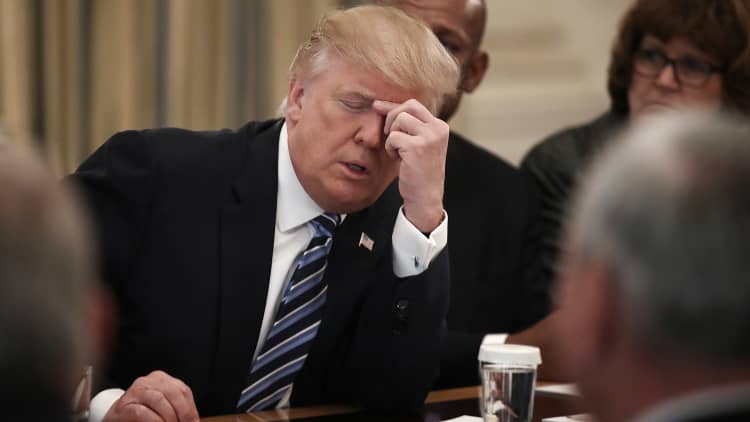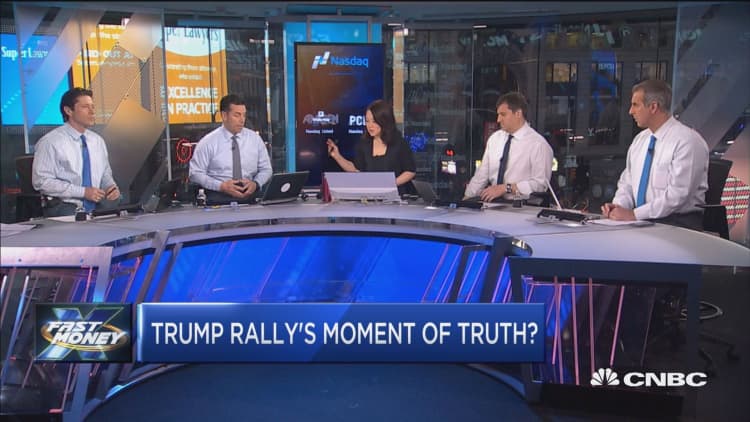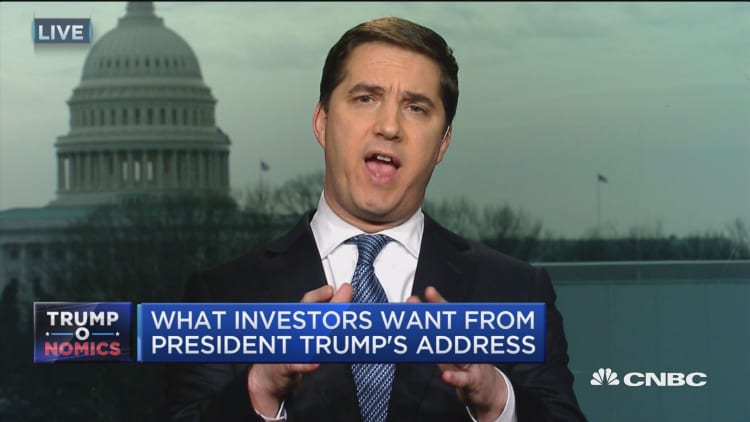
Suddenly, President Donald Trump's legislative agenda is in deep trouble.
On health care, the budget and tax reform, Trump faces strong resistance barely a month into his presidency. Though Republicans who control Congress have set a streamlined path designed to make Democrats irrelevant, disagreements within the GOP now threaten that plan across the board.
The plan calls for repealing Obamacare and replacing it by mid-April, passing a fiscal 2018 budget and then enacting tax reform by August. That ambitious timetable sounds reasonable in light of recent history; by the end of February 2009, under new President Barack Obama, Democratic congressional majorities had already swept through a massive economic stimulus.
But neither the White House nor congressional Republicans have yet released their long-promised plans to replace Obamacare with better, cheaper alternatives. On Monday, leaders of two different conservative groups within the House Republican caucus declared their opposition to the approach advanced by Speaker Paul Ryan.
Their objection: the plan's tax credits for Americans to buy insurance represent a new federal entitlement too much like Obamacare itself. Yet such tax credits are vital to preventing massive drops in the number of people with health insurance, which Senate Republicans, Republican governors and Trump himself have said they want to avoid.
Ryan aims to overcome intraparty resistance by daring GOP dissenters to vote no when a repeal-and-replacement plan reaches the House floor. That's a risky approach to take with firebrands so willing to defy their leaders that they forced the resignation of the speaker's predecessor, John Boehner.
The White House on Monday outlined its broad approach for the budget. Budget Director Mick Mulvaney said the administration aimed to boost defense spending by $54 billion, financed through offsetting cuts in domestic spending.
His objective faces huge obstacles. Such a budget shift would require legislation to alter statutory spending caps that, unlike the Obamacare repeal Trump hopes to pass, would not be shielded from Senate filibuster.
Chances the White House could attract the eight Democrats needed to back such a shift are remote. So are chances of holding all 52 Senate Republicans behind it.

As the third-ranking Senate Republican, John Thune, told CNBC in November, "We've done all we can" to cut domestic spending through the Obama-era budget sequester limits. Like Ryan, Thune identified the large entitlement programs of Medicare and Social Security as the place to find additional budget savings. But the president himself has loudly opposed touching them.
That leaves tax reform. The Trump White House and congressional Republicans alike have hoped to, at a minimum, overhaul corporate taxation with the goal of reducing the current top rate of 35 percent and inducing U.S. multinational companies to bring back tax-deferred profits sitting overseas to boost domestic investment. Their larger aim is a comprehensive overhaul of individual taxation, too.
Their legislative strategy calls for acting first on Obamacare; any delay on that issue slows the pace of tax reform. But even on corporate tax reform, Republicans remain far from consensus.
The linchpin of the House GOP approach is the so-called border adjustment tax hitting imports and exempting exports. Leaders cite two principal merits: it would encourage more investment in the U.S., and it would generate more than $1 trillion, offsetting the cost of reducing the corporate rate to an internationally competitive 20 percent.
The problem is, a growing number of Republican senators oppose border adjustment because they believe it would harm businesses in their states. Senate Republicans have not yet offered an alternative corporate tax plan.
Trump will address a joint session of Congress Tuesday night in hopes of jump-starting his agenda. His 44 percent approval rating in the most recent NBC News/Wall Street Journal poll — much weaker than that of other new presidents in recent years — dims prospects for attracting new supporters for his legislative goals.
Still, he remains highly popular with rank-and-file Republicans. Fully 86 percent approve of his job performance, nearly matching the 88 percent of Republicans who voted for him last November.
But passing his agenda through Congress without Democratic help requires support from an even higher proportion of Republican lawmakers. Right now the new president doesn't have it.
Watch: What investors want to hear tonight



